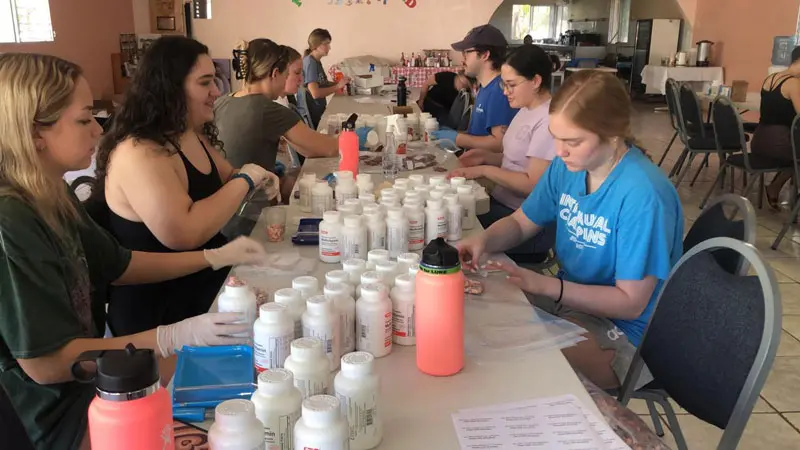

On their first day in Honduras, Fredonia students sort pills – dividing bottles containing 1,000 pills, such as ibuprofen, into smaller amounts so they’re ready for the pharmacy at the brigades to be distributed to patients.


On their first day in Honduras, Fredonia students sort pills – dividing bottles containing 1,000 pills, such as ibuprofen, into smaller amounts so they’re ready for the pharmacy at the brigades to be distributed to patients.
Students who served on medical brigades in Honduras during the J-Term will describe this unique experience at an informal program in the Science Center’s Kelly Family Auditorium, Room 105, on Friday, Feb. 3, at 3 p.m.
The contingent of 12 students, one faculty member and three alumni conducted medical brigades in four rural villages, assisting Honduras medical doctors in the delivery of basic healthcare services to 550 people during the first week of January. Each brigade, or station, had a specific function, such as taking vitals to prepare the patient to see a physician or distributing medicine after the patient was evaluated.
This, the third Honduras experience undertaken by students enrolled in Honduras: Health Care in Central America, a study abroad program, went very well, said SUNY Distinguished Teaching Professor Ted Lee, who coordinates the program. “Everything wound up being pretty normal compared to the pre-pandemic programs. I was very pleased that our students got the full experience during our time in Honduras,” Dr. Lee noted.
Each student will present two or three slides taken during their trip and answer audience questions about the experience. Biology, Biochemistry, Exercise Science and Psychology are among the majors represented by the students. Two sophomores were among the group of juniors and seniors who went on the adventure. The three alumni were Hailey Gould, ’21, who served as program assistant, Taylor Marelli, ’21 and Emma Pryll, ’22.
The contingent was also joined by a nurse, pharmacist and physician from the United States who were instrumental in the success of the program. In addition to the group from the states, there were four physicians, a nurse, pharmacist, three interpreters, two security guards, a driver, three student volunteers and the program coordinator from Honduras participating in the work for the week.
Opportunities to see the healthcare conditions in Honduras and interact with children at the orphanage, along with compiling daily journals of their experiences, were among the key takeaways for students, said Lee, who accompanied the Fredonia group.
“I was very pleased that our students got to spend so much time with the children living at the Sociedad community, the children have had limited interactions with guests during the pandemic and they were thrilled to have so many enthusiastic students to talk with during the week,” Lee explained. The week concluded with a pinata party with pizza and treats for the children.
A new undertaking – water research to evaluate the effectiveness of filters used to provide safe drinking water – was the focus of Delanie Tunstall, a senior Biology major in the B.S./M.S. multi-award program. Three of the villages where the medical brigades were conducted do not have water filtration systems in their homes. One village is to receive water filters in late January and Ms. Tunstall and other students plan to return this summer to test the effectiveness of the new filters.
The Honduras presentation is free and open to the public.